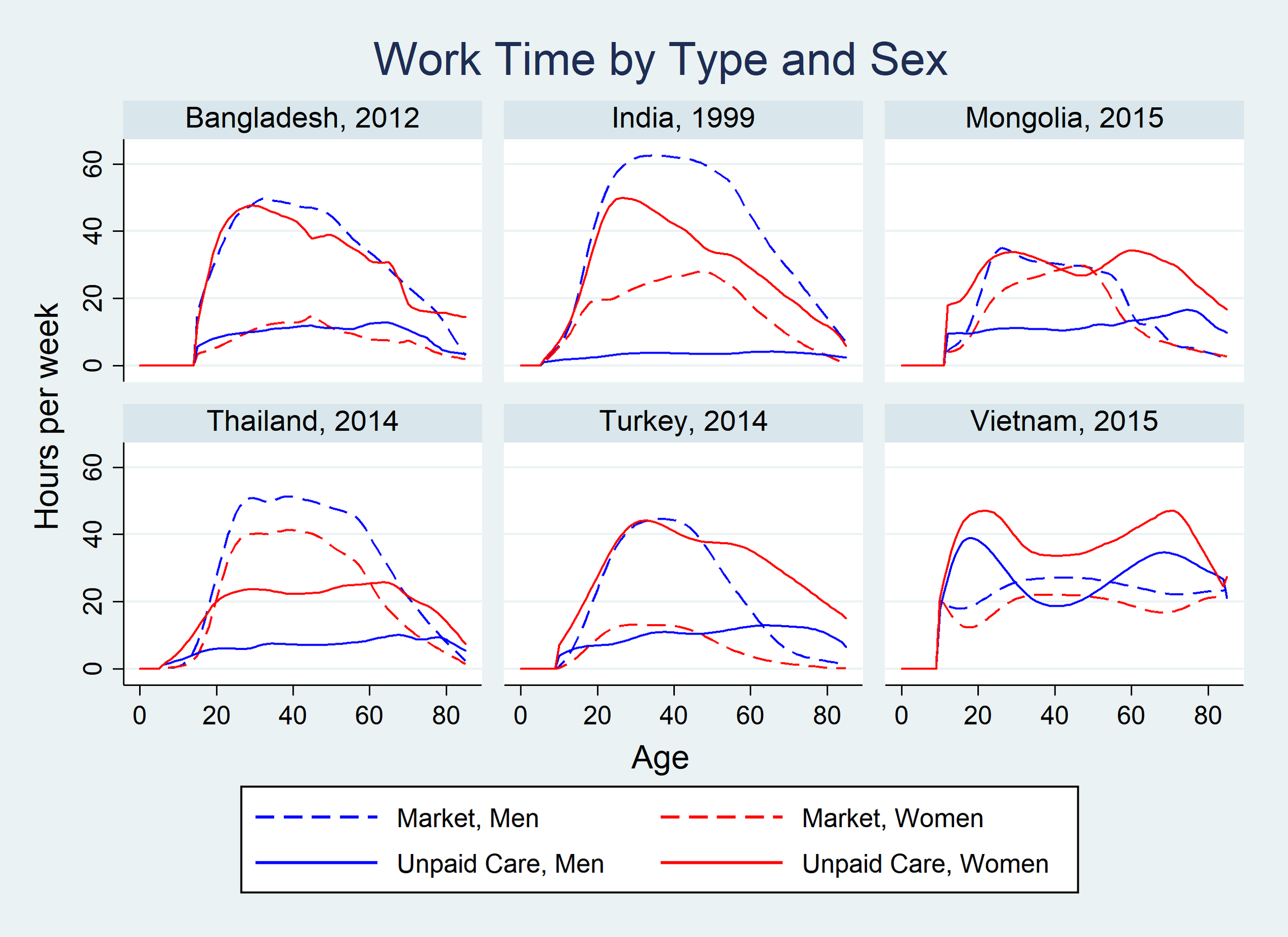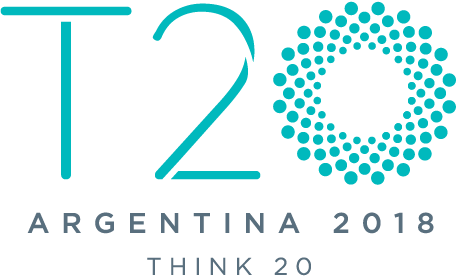Time Use and Transfers in the Americas - Producing, Consuming, and Sharing Time Across Generations and Genders
CWW researchers published Time Use and Transfers in the Americas: Producing, Consuming, and Sharing Time Across Generations and Genders, featuring chapters on National Time Transfer Accounts methodology, results from Costa Rica, Uruguay, Colombia, and the United States, as well as cross-country comparative work.
Urdinola, B.P. and Tovar, J.A., 2019. Time Use and Transfers in the Americas. Springer International Publishing.
About this book:
This book provides a comparison of the measurement in time and monetary units of unpaid domestic work in Colombia, Costa Rica, Uruguay, and the Hispanic ethnicity in the United States. A standardized technique allows the development of comparable estimates across countries per age and gender which reveal specific behavioral patterns over the life cycle. A mixture of economic conditions, social norms, and demographic trends provide insightful explanations for the unequal burden that women and girls carry when dealing with unpaid domestic activities, an economically significant but traditionally neglected activity. As such, the book is of interested to practitioners in all social sciences, particularly sociologists, demographers, economists, and policymakers.
Older people as unpaid care work producers at HelpAge Asia-Pacific Conference
CWW PI at HelpAge Asia-Pacific Regional Conference, focus on older women as care producers
Gretchen Donehower, PI of CWW, participated remotely in the HelpAge Asia-Pacific Regional Conference in Tehran, I.R. Iran, October 23-25, 2018. The focus of the conference, from the conference website, was "Family, Community and State in Ageing Societies - Demographic ageing is having profound impact on societal dynamics in Asia. The functions of the family, communities and governments are changing rapidly. How they can reinforce each other, and how they relate with longer periods of independence in old age, will need to be re-examined.”
Donehower presented research on time transfers in Asian countries, showing that women produce unpaid care work and transfer it to family and community members until the oldest age groups we observe. This means that aging societies have more productive potential than usually considered. It will take the right policies to enhance this potential and ensure the well-being of older persons and aging societies.
The conference paper can be accessed here.
Average time spent working at each age by type of work and sex, hours per week.
CWW Takes Part in G20 Task Force on Gender Economic Equity
Counting Women's Work collaborated with a task force on Gender Economic Equity to make sure that discussions of women’s economic empowerment included evidence from both the market and household economies.
While Argentina holds the Presidency of the G20, or “Group of Twenty,” Argentinian officials and researchers have been coordinating several task forces to ensure that a diverse set of issues and viewpoints are represented in the talks. They call this effort the “Think 20” or “T20” group of task forces and the list of all topics appears here.
Counting Women’s Work was invited to be part of the task force on Gender Economic Equality and the project was represented by Mexico CWW team leader Estela Rivero Fuentes. Dr. Rivero Fuentes used CWW research to highlight the role of unpaid care work in creating gender inequality in access to market labor force opportunities. In addition, she was a contributing author to the Task Force’s volume on Gender Economic Equity: An Imperative for the G20. This represents one of the highest-level policy interactions for CWW.
After a meeting of the task force in September 2018, the T20 produced a comprehensive document that covers the current empirical reality of gendered economies around the world, as well as a set of specific policy recommendations that will be presented during the G20 summit in Buenos Aires in November 2018. This will be the first G20 summit held in South America.
CWW Research in Second National Transfer Accounts project Bulletin
This issue of the NTA Bulletin summarizes policy messages from Counting Women’s Work, highlighting how including unpaid care work in policy analysis creates better policy and emphasizing the need for more and better data on time use and unpaid care work.
Counting Women's Work was created in part to bring a gender perspective to the National Transfer Accounts (NTA) project, which produces a series of short bulletins showcasing project results and significance for policy. CWW research has been the focus of two bulletins, the second published in March 2018. NTA Bulletin No. 13. reveals the vast amount of economic activity that is “invisible” because unpaid care work not usually counted as part of the economy despite its central role in producing the market labor force of the future and sustaining social welfare. The bulletin argues for the necessity of more and better data on time use and unpaid care work to improve many economic, family, and social policy.
Download NTA Bulletin No. 13 from the NTA website.
CWW Research in National Transfer Accounts project Bulletin
This issue of the NTA Bulletin features CWW research and describes the project and reports some illustrative results from Ghana, Mexico, Senegal, the United States, and Vietnam.
The Counting Women's Work was created in part to bring a gender perspective to the National Transfer Accounts (NTA) project, which produces a series of short bulletins showcasing project results and significance for policy. CWW research is the focus of NTA Bulletin No. 11. This issue of the NTA Bulletin describes the project and reports some illustrative results from Ghana, Mexico, Senegal, the United States, and Vietnam. These examples demonstrate how CWW analysis makes it possible to quantify the differences between men and women in market work and wages, the excess total work time that most women spend relative to men, the potential barrier that household responsibilities represent to women’s education and career development, and the “hidden” costs of children.
Download NTA Bulletin No. 11 from the NTA website.
Winners of the NTA XI Global Workshop Gender Paper Prize
We are pleased to announce the three winners of the Gender Paper Prize at the 11th Global Meeting of the NTA Network, held in Dakar in June 2016. The winning papers feature results from Senegal, Costa Rica, and comparative work covering many countries in Europe.
We are pleased to announce the three winners of the Gender Paper Prize at the 11th Global Meeting of the NTA Network, held in Dakar in June 2016. The winning papers are:
ARBITRAGE MARCHÉ DU TRAVAIL ET MARCHÉ DOMESTIQUE, by Latif Dramani, Oumy Laye, Sene Ndeye Sokhor
CHALLENGES TO INCREASE FEMALE LABOR FORCE PARTICIPATION: GENDER INEQUALITY IN COSTA RICA, by Pamela Jiménez-Fontana
THE PATTERNS OF NON‑MONETARY TRANSFERS IN EUROPE: A HISTORICAL NTTA ANALYSIS BY AGE AND GENDER, by Ana Šeme, Lili Vargha, Tanja Istenič, Jože Sambt
All three papers are available as NTA Working Papers and can be downloaded from the NTA website. Paper abstracts and direct download links are available below.
PAPER ABSTRACTS:
ARBITRAGE MARCHÉ DU TRAVAIL ET MARCHÉ DOMESTIQUE, by Latif Dramani, Oumy Laye, Sene Ndeye Sokhor
In search of well-being, families devote much time on domestic activities including cooking, cleaning, laundry, care for children and senior. Yet these various domestic activities, called "domestic production" are not regarded as an income-generating economic activity and are not sufficiently taken into consideration in the national accounts. The work of Stiglitz et al. (2009) highlight the need to measure this domestic production, to be taken into account in the calculation of household living standards. The method of the National Time Transfer Account (NTTA) was used to measure the time spent on domestic activities. The survey ESPS of 2011 allowed to measure the time spent on domestic activities. The results showed that domestic work time is an average of 7 hours per day for women while it is 30 minutes a day for men. The survey showed that in the paid labor market, the level of men participation in the labor market is significantly higher than that of women with 55.2% of active employed men against 34.3% of active employed women. Moreover, the estimation of women's contribution to the creation of wealth has shown that women produce 35% of the labor income against 65% for men in 2011. By contrast, concerning domestic work, women produce 63% of domestic production and men 37% of this production in 2011. These results demonstrate the existence of an implicit arbitration in households for domestic activity and paid work. In a world where time is increasingly monetized, it is interesting to wonder about the future of domestic work in Senegal and in Africa in general.
Costa Rica is at the end of the demographic transition with an insufficient educational profile to meet the demands of the market. The benefits of the first demographic dividend were not materialize due to the lack of public policies that did not promote better skills for the new generations that will have to support an aging population. In this context, a potential opportunity arises: low female labor force participation poses a scope for accelerating economic growth through greater incorporation of women into the market. This opportunity known as gender dividend, only materialize if public policies reduce the barriers that limit a greater female participation. Despite the rapid growth of the participation rate of women in the market, in the last five years a stagnation of this indicator is observed, which suggests that factors such as care and unpaid work limit the participation of women on the market. Gender inequality in Costa Rica is evident: low female political participation, women as the main responsible for care and policies do not encourage parental responsibility. Some efforts such as childcare networks intend to reduce female unpaid work. However, many of these programs have low coverage and also are target only for people on poverty. In this article I analyze gender inequality on market and unpaid production using the methodology developed by international Counting Women's Work and the project National Transfer Accounts. Also, per capita profiles of key domestic activities by age and sex are analyzed.
THE PATTERNS OF NON‑MONETARY TRANSFERS IN EUROPE: A HISTORICAL NTTA ANALYSIS BY AGE AND GENDER, by Ana Šeme, Lili Vargha, Tanja Istenič, Jože Sambt
This paper analyses the age patterns of production, consumption and net transfers in the form of unpaid work by gender and over time. Using National Time Transfer Accounts methodology, we present the historical results for several European countries for the first time. The results show that the evolution of age patterns over time is different for men and women and is highly affected by different demographic trends, as well as by institutional background of countries. We discover that despite differences over time and across countries, two main characteristics of age patterns do not change: transfers of unpaid work still flow, first, from women to men and secondly, from working‑age population mostly to children and to a lesser extent to the elderly.
Categories
Tags
- Africa 3
- Asia 3
- Audio 2
- Brazil 1
- Burkina Faso 2
- Colombia 10
- Costa Rica 10
- Covid19 2
- Cross-country 19
- El Salvador 1
- Europe 5
- Example Code 1
- Fertility 2
- Gender Dividends 3
- Ghana 4
- Hispanic ethnicity 1
- Human Capital 1
- Hungary 1
- India 3
- Kenya 2
- Latin America 7
- Mauritius 2
- Methodology 6
- Mexico 4
- Policy-related 10
- Senegal 5
- Slides 10
- Slovenia 1
- South Africa 9
- South Korea 2
- Spain 2
- Spanish language 4
- Turkey 1
- United States 3
- Uruguay 2
- Video 7
- Vietnam 4
- Web Conference 4














